- Home
- Martin Archer
The Alchemist's Revenge
The Alchemist's Revenge Read online
My horse was still anxiously dancing about when the Commander nodded to Henry who was standing next to the windlass that raised and lowered the gate. The two men with Henry, both veteran foot archers who had been helping him train the states’ soldiers, immediately began enthusiastically cranking. The rusty chains rattled and the huge gate in the city wall slowly rose. Behind us I could hear the sound of many horses stamping their feet and much talking and shouted orders.
As soon as the gate was high enough for Commander Courtenay to ride under it, he raised his bow over his head, kicked his horse in the ribs and shouted “FORWARD.” As he did, he pointed his bow at the bridge over the moat in front of the gate and the densely packed camp of the Greek-led army that began only a hundred paces or so beyond the drawbridge.
I was right behind him as he galloped towards them.
The Alchemist’s Revenge
A medieval Novel
Preface
Things had gotten confused when the cold weather and a handful of English archers caused the Orthodox Christian army to fail in its initial effort to invade the Latin Empire and replace its Constantinople-based empress with one of their own kings. The surviving Orthodox Christian soldiers, mostly Greeks, had returned to the Greek coast whereupon their Venetian allies somehow managed to put together a fleet of transports and carry part of the Orthodox army eastward along the coast to the port city of Adrianople.
The Venetian sea-lift put the Orthodox soldiers carried by the Venetian transports much nearer to Constantinople than the soldiers it was forced to leave behind. The men carried by the Venetian transports were, in one sense, the fortunate ones in that they only had to march the rest of the way to the great capital city of the Latin Empire.
On the other hand, the Venetian-carried Greeks and their mercenaries were unfortunate in that they were incessantly attacked by companies of English horse archers as they moved north toward Constantinople. The English hung on their flanks like packs of wolves and used the superior range of their longbows to whittle down their numbers and prevent them from leaving the main column to forage amongst the nearby villages.
The Venetian-carried Greeks arrived outside of Constantinople’s walls in the summer of 1219 hungry and somewhat fewer in number. Even so, they were optimistic because they knew they would sooner or later be joined by the rest of the Greek-led army. They would then attack and overwhelm the city’s defenders by the sheer weight of their numbers. Their priests assured them that victory was certain.
Indeed, victory was so sure to occur as a result of their army’s great numbers that both the would-be new emperor, currently the king of the Greek state of Epirus, and exiled Patriarch of the Orthodox Church had begun making plans for their grand entrances into the city.
The return of Constantinople to Greek control was certain because the rest of the huge Orthodox army was slowly but surely marching to join the early arrivals. When they arrived, they would help the early arrivals finish off the Empress’s small army and replace her crusader-French gobbling nobles and Latin-gobbling priests with Greek-gobbling nobles and the Patriarch’s Greek-gobbling priests.
The men of the Greek army who had to march all the way to Constantinople finally reached Adrianople in the summer of 1219. They rested for a couple of days whilst gathering some of the food supplies they would need in the days ahead, and then they began marching north on the old Roman road to join those who had been carried to Adrianople by the Venetians. They too assumed they would be able to obtain the rest of the food supplies they would need by foraging for it along the way. And they too were mistaken and arrived outside Constantinople’s formidable walls hungry and fewer in number because of a few hundred English wolves.
Despite its losses and desertions, the overall size of the Orthodox army that finally arrived in front of Constantinople’s great city wall was huge, well over a hundred thousand men. Constantinople, in contrast, was defended by about seven thousand men of whom approximately three thousand were highly trained English archers equipped with the latest and most modern weapons, namely longbows and bladed pikes with long handles.
Even though the Orthodox army was still huge, it was also significantly smaller and its men somewhat less enthusiastic than when it had first been formed. The reduction of its size and enthusiasm had occurred as a result of constant small attacks by a few hundred horse-riding English archers and a costly defeat they had inflicted on the Orthodox army in the early spring right after the army had been formed.
The Orthodox army’s earlier defeat occurred when the entire Greek-led army tried to cross the mountains in order to march directly to Constantinople, the capital city of the Latin Empire.
An inexperienced Greek commander, almost certainly chosen for the position mostly because he was the brother of the Greek king who would be the new emperor, had made a serious mistake by ordering his men to march to Constantinople on the road through the mountains. It was a mistake because the weather was still much too cold in the mountains and a few hundred horse-riding archers from Cornwall’s free Company of Archers had gotten there first and held the narrow Roman-built stone bridges that spanned the raging torrents of the water that ran off the mountains.
Had men of the Orthodox army been able to cross through the freezing weather on the mountain without stopping, they would have already reached Constantinople’s formidable walls and begun besieging the city. Instead, they failed; they had been forced to turn back after suffering horribly from the cold and the arrows being pushed out of the archers’ longbows.
Even so, and unfortunately for Constantinople’s Empress and the men of the Cornwall-based Company of Archers, a good part of the mostly Greek army, at least three men out of every four, had been able to withdraw from the mountains without being killed or becoming so frost-bitten that they could not continue. The survivors had returned to the coast whereupon some of them were carried down the coast to the port city of Adrianople by a hastily assembled Venetian fleet.
Once landed at Adrianople, the Greek soldiers carried by the Venetians, only about a third of the huge army due to the lack of sufficient Venetian transports, had begun marching overland on the old Roman road that ran between Adrianople and Constantinople. The other two-thirds of the army’s survivors marched down the coastal road to Adrianople, and then, after they had reached it and rested for a few days, began the long march north to Constantinople. It was the summer of the year 1219 and the days were long and hot.
The stated purpose of the Orthodox army’s invasion, according to the Greek-gobbling Patriarch of the Orthodox Church, was to “throw the heretics and their Latin-gobbling priests out of our great capital city and restore the Byzantine Empire with an emperor chosen by God.”
In other words, if the Greek army succeeded, the Patriarch’s Greek-gobbling priests would once again be able to tell the people what God wanted them to do and collect their tithes, and the new emperor’s Greek-gobbling lords would see to it that they did it and collect their taxes.
Most of the people in Constantinople, of course, did not really give a shite who won the coming war. They were stuck with tithes and taxes no matter who won, and just wanted to be left alone to get on with their lives.
On the other hand, most of the city’s residents were Greek-gobblers and looked to the Patriarch of the Orthodox Church and his priests to tell them how God wanted them to behave. As a result, other things being equal, most of the residents of the Latin Empire’s great capital city almost certainly would have preferred that the Greeks win so they could pay their tithes to the Greek-gobbling priests of the Patriarch instead of to the Latin-gobbling priests of the Pope in Rome. The Latin priests, after all, did not make the sign of the cross properly and even their own
parishioners could not understand them when they prayed. There was also the very real possibility that God did not understand Latin as well as he understood Greek.
The problem for the mostly Greek-gobbling army and the would-be emperor and the Patriarch, of course, was that other things were not equal. That was because the Latin Empire’s Empress and her Latin-gobbling priests and her crusader French-gobbling lords had held the great city and the vassal states of the Latin Empire, over which she supposedly ruled, ever since the crusaders of Fourth Crusade took the city some fifteen years earlier.
It hardly mattered to the people of the city and its vassal states who ruled them. As a result, a goodly number of the city’s Orthodox-praying citizens had accepted the Empress’s coins and began working full-time to strengthen the city’s walls and defences against the on-coming invaders.
In addition to the full-time workers who were paid for their work on the walls, everyone in the city was required to work without pay to strengthen the city’s defences on three required mornings each week. The city’s residents did not know it at the time, but when the Greek-led Orthodox army arrived every one of the Empress’s subjects would be required to work for free every morning.
Whether those who worked without pay supported the Empress was not the question—they were encouraged to work by the reality that the Empress’s personal guards, the loyalty-sworn Vikings and Rus known as the Varangian axe-men, who also acted as the city’s night watch, would take their heads if they did not. Losing one’s head happened when a man was found in the city during the hours everyone was supposed to be working to strengthen the city’s great walls and other defences.
Indeed, some of the Orthodox believers even signed on to fight for the Empress—which was more than many of the princes and kings of the Empress’s vassal states did. They, some of the Latin Empire’s kings and princes that is, had long ago decided to wait to see who was likely to win before they committed themselves and brought their men in to help defend the city.
Cornwall’s free company known as The Company of Archers was among the Empress’s few reliable supporters. Its commander, George Courtenay, and his captains knew in their hearts that God favoured the French-born Empress—because he had showered her with so many sources of coins that she could use to pay them for their services. Besides that, she had spent quite some time in England where George had actually met her on several occasions and his father, the Company’s former commander, had apparently gotten to know her quite well.
As firm believers in God, particularly in matters related to the gathering of coins from people God had blessed with them, the archers could do no less than accept the substantial amount of coins offered by the Empress if they would help protect her and the wealthy refugees fleeing the war if they would carry them to safety. And, of course, the archers also did their best to get even more coins from the Empress’s enemies—by taking their galleys and transports as prizes and selling the weapons and armour they were able to strip off the enemy dead.
Most of the revenues the Company of Archers earned from helping to defend the Empress and her great capital city, however, came from the tolls the Company’s galleys collected in the Empress’s name from the numerous boats of every type and nation that plied the great waterway that passed in front of Constantinople’s walls. The tolls were substantial and continuous enough to make it worthwhile for the Company to take on the risk of helping the Empress defend her Empire from the many kings and princes who coveted it.
The Company’s takings from the Empress’s many enemies, on the other hand, were decidedly mixed. At first its takings were quite large. For example, the archers’ galleys carrying the Empress’s coins to Rome to pay for the papal prayers, which had been needed so God would recognize the widowed Empress as her son’s regent, were attacked twice by Venetian fleets.
Venice’s attacks on the Company’s galleys occurred because Venice’s king fancied the position for himself and, accordingly, did not want God to agree that the Empress should be the empire’s ruler until her son came of age. Also, of course, the attacks occurred because it was a large amount of coins and the Venetian captains wanted them for themselves.
In any event, as a result of the Venetian attacks, the archers took a substantial number of valuable Venetian war galleys as prizes and, equally important, were able to negotiate a lower price with the Pope for God’s approval of the Empress. The archers, of course, kept the rest of prayer coins in the reasonable belief that the Pope had not required all the coins they had brought from the Empress because God wanted the Company to have them.
After that initial burst of coin gathering, however, the Company’s takings from the Empress’s enemies were nowhere near as great as its commander, George Courtenay, and his captains had hoped. The Company’s number two and the commander of its horse archers, Richard Ryder, for example, had taken a huge haul of weapons and armour off the Greek army when he and his horse archers stopped the Greeks in the bitter cold at a bridge on the old Roman road that ran through the mountains.
Unfortunately, Richard’s men were forced to throw the weapons and armour they captured into the cold and raging maintain stream the bridge crossed because they had no way to carry them when they hurriedly fell back to an even better blocking position at a bridge higher up on the other side of the mountain’s summit.
In one sense, the archers’ rapid withdrawal without the captured weapons was very much the great success Richard had intended it to be when he realized the effect the terrible cold was having on his enemies—because the rapid retreat of the archers had encouraged the Greeks and their allies to continue marching even deeper into the mountains, whereupon the archers stopped them again at another bridge.
It was there in the mountains that many of the Orthodox soldiers froze to death before their commander finally understood that Richard and his men were deliberately retreating to draw his army deeper into the mountains. At that point, he ordered his army’s survivors to withdraw so they could live to fight another day.
The withdrawal was somewhat of a financial success for the Company in that Richard and his archers captured some of the weapons and armour the army’s Greek-led soldiers lost when they froze to death or left behind when they fled back down the mountain in an effort to escape the cold.
Where Richard and his horse archers had failed miserably was in not letting the cold completely destroy the Greek army when they could have done so. Their failure was the result of a mistake made by Richard that only he knew about—he had talked too much after he had gotten to know a Greek soldier who had been trying to negotiate a passage over the mountains for the Orthodox army.
As a result of Richard’s loose lips, the Greek soldier whose life he had tried to save came to understand that Richard was attempting to draw out the negotiations in order to delay the Orthodox army until the cold weather destroyed it. The Greek was an astute and loyal soldier; he had explained to his commander what the archers were doing in time for most of the Greeks and their fellow believers to withdraw.
There had been some takings from the Empress’s other enemies as well. The archer-rowed galleys of the Company of Archers that had been sent out from Constantinople to harass the Orthodox ports, for example, had picked off a couple of the slave-rowed Venetian galleys which were escorting the Venetian transports which had carried part of the somewhat reduced Orthodox army to Adrianople.
Unfortunately, the Company’s galleys had been forced to ignore the Venetian ships and cogs carrying the Orthodox army. They ignored them because the Venetian transports had already been loaded with Greek soldiers for transport by sea to a port closer to Constantinople.
In essence, as a result of the soldiers they were carrying, the Venetian transports had become too dangerous for the galleys of the English company to try to take. The potential rewards from taking transports loaded with soldiers as prizes were just not worth the casualties that would be expected from the fighting that it would require.
; Similarly, after the Greeks disembarked at Adrianople and began marching to Constantinople, the Venetian transports still could not be taken without serious English casualties because they remained clustered together in Adrianople’s harbour with a substantial number of Greek soldiers remaining on board to guard them. In the end, the Company’s galleys gave up waiting for the Venetian fleet to come out; they sailed and rowed their way back to Constantinople so the archers in their crews could be used to reinforce the city’s defenders.
Surprisingly, the Latin lord at Adrianople had welcomed the Greek soldiers when they arrived on Venetian transports—he had turned against the Empress in return for promises of a kingly title recognized by the Orthodox Patriarch and the promises of Venice’s and France’s protection when the Byzantine Empire was re-established. He also required, and was given, French-owned estates in France and England in case the Empress won and he had to run.
News that the Venetians had carried some of the Orthodox army to Adrianople, and the rest of the Greek-led army was marching there, reached Constantinople via the Company’s returning galleys. It resulted in the Company’s horse archers being hastily recalled from where they had been vainly waiting in the mountains for the Orthodox army to re-appear when the weather got warmer. They immediately returned to Constantinople for supplies and to drop off their wounded and poxed.
The horse archers rested in the city for a few days, and then Richard Ryder, the Company’s deputy commander and the man whose good nature and loose lips had allowed the Greek army to escape from the mountains, once again led them out of the city to harass the Orthodox army, this time as it marched towards Constantinople from Adrianople.
Chapter One
The Orthodox army begins to arrive.
I had a great revelation jump into my head early one evening while we were awaiting the imminent arrival of the first soldiers of the Greek-led army. It arrived, the revelation that is, whilst I was drinking a bowl of ale and thinking about whom else might be a threat to the Empress and the coins she was paying my company to help keep her on the throne of the Latin Empire. I was also, at the time, trying to distract myself from thinking about women, particularly, the young widow I hoped would be coming to my room for a “visit” later that evening.

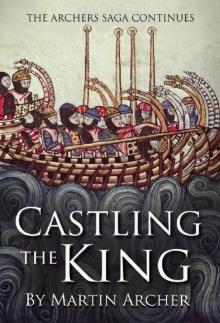 Castling The King
Castling The King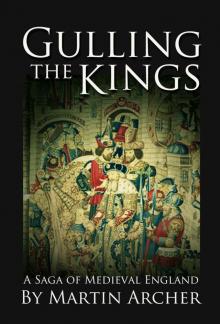 Gulling The Kings
Gulling The Kings Israel's Next War
Israel's Next War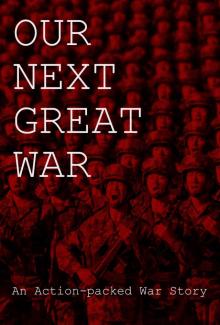 Our Next Great War
Our Next Great War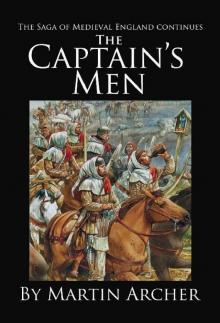 The Captain's Men
The Captain's Men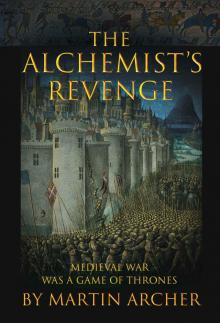 The Alchemist's Revenge
The Alchemist's Revenge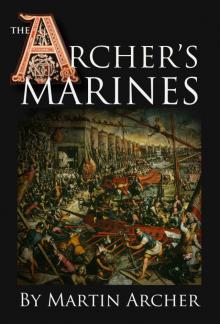 The Archer's Marines: The First Marines - Medieval fiction action story about Marines, naval warfare, and knights after King Richard's crusade in Syria, ... times (The Company of Archers Book 5)
The Archer's Marines: The First Marines - Medieval fiction action story about Marines, naval warfare, and knights after King Richard's crusade in Syria, ... times (The Company of Archers Book 5)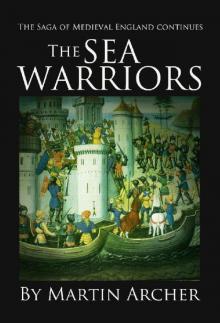 Sea Warriors
Sea Warriors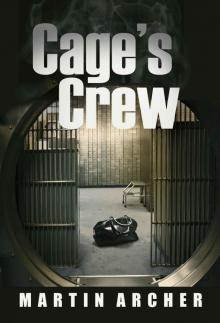 Cage's Crew
Cage's Crew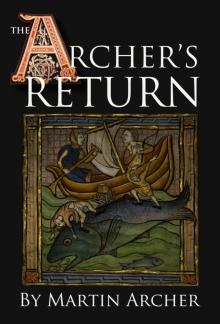 The Archer's Return: Medieval story in feudal times about knights, Templars, crusaders, Marines, and naval warfare during the Middle Ages in England in the reign of King Richard the lionhearted
The Archer's Return: Medieval story in feudal times about knights, Templars, crusaders, Marines, and naval warfare during the Middle Ages in England in the reign of King Richard the lionhearted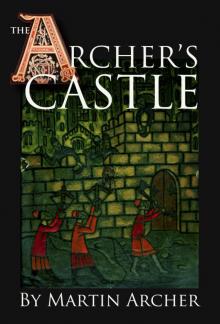 The Archer's Castle: Exciting medieval novel and historical fiction about an English archer, knights templar, and the crusades during the middle ages in England in feudal times before Thomas Cromwell
The Archer's Castle: Exciting medieval novel and historical fiction about an English archer, knights templar, and the crusades during the middle ages in England in feudal times before Thomas Cromwell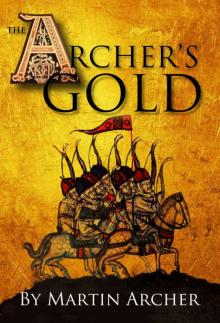 The Archer's Gold: Medieval Military fiction: A Novel about Wars, Knights, Pirates, and Crusaders in The Years of the Feudal Middle Ages of William Marshall ... (The Company of English Archers Book 7)
The Archer's Gold: Medieval Military fiction: A Novel about Wars, Knights, Pirates, and Crusaders in The Years of the Feudal Middle Ages of William Marshall ... (The Company of English Archers Book 7)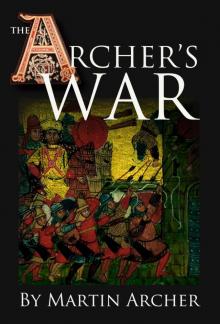 The Archer's War: Exciting good read - adventure fiction about fighting and combat during medieval times in feudal England with archers, longbows, knights, ... (The Company of English Archers Book 4)
The Archer's War: Exciting good read - adventure fiction about fighting and combat during medieval times in feudal England with archers, longbows, knights, ... (The Company of English Archers Book 4)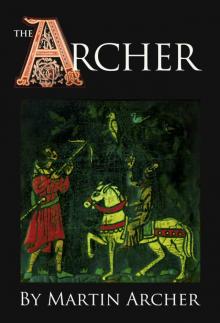 The Archer: Historical Fiction: exciting novel about Marines and Naval Warfare of medieval England set in feudal times with knights,Templars, and crusaders during Richard the lionhearted's reign
The Archer: Historical Fiction: exciting novel about Marines and Naval Warfare of medieval England set in feudal times with knights,Templars, and crusaders during Richard the lionhearted's reign